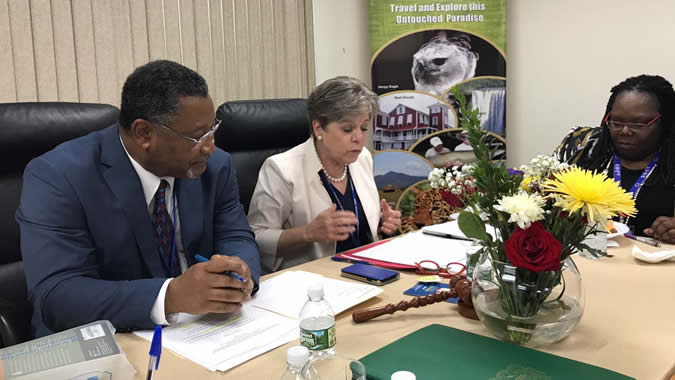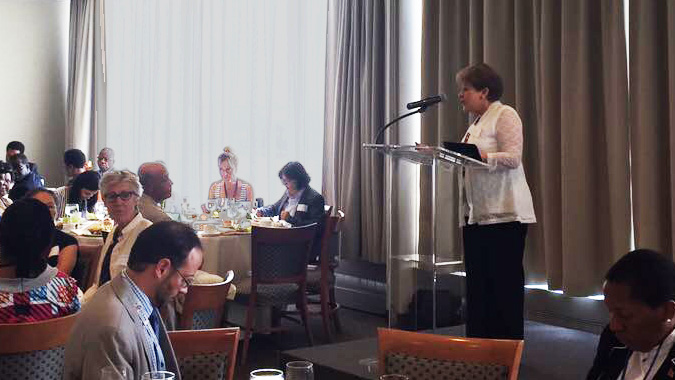ECLAC’s Executive Secretary Met with Caribbean Ambassadors to Evaluate the Subregion’s Priorities regarding the 2030 Agenda
Alicia Bárcena encouraged Caribbean countries to present their Voluntary National Reviews on the Sustainable Development Goals in future sessions of the High-Level Political Forum, which is held each year in New York.

The Executive Secretary of the Economic Commission for Latin America and the Caribbean (ECLAC), Alicia Bárcena, met today in New York with representatives of the countries of the Caribbean Community (CARICOM) to evaluate the subregion’s priorities and specific needs regarding implementation of the 2030 Agenda for Sustainable Development and its 17 Sustainable Development Goals (SDGs).
Bárcena began by congratulating Belize for being the first country in the Caribbean to present its Voluntary National Review (VNR) to the High-Level Political Forum on Sustainable Development (HLPF), which held its annual session this year on July 10-19 at the UN headquarters in New York. The Bahamas and Jamaica, meanwhile, will report on their progress in 2018.
“Peer review and exchange is fundamental for strengthening implementation of the 2030 Agenda. This process is oriented toward establishing a common vision with all stakeholders, staying the course and being accountable, not only to the regional and global communities, but especially to national ones,” Bárcena stated, highlighting the role played in this sense by the regional mechanism created for follow-up and monitoring of the Agenda: the Forum of the Countries of Latin America and the Caribbean on Sustainable Development.
ECLAC’s Executive Secretary said that the presentation of more reports by Caribbean countries “would be a strong sign of the subregion’s commitment to implementation of the SDGs,” a task that requires a coherent and resilient institutional architecture for integrated and cross-sector planning and decision-making, she indicated.
“ECLAC, which has a Subregional Headquarters in Port of Spain (Trinidad and Tobago), is ready to support Caribbean countries, both individually and collectively, on all the aspects related to achieving the SDGs, from measurement and the analysis of means of implementation to the reporting of outcomes,” Bárcena said.
At this time, the Commission is working on a project that, in its initial stage, involves six countries of the subregion and seeks to strengthen both the national architecture for inter-institutional follow-up to the Agenda as well as national statistics systems for the effective implementation of the SDGs.
In addition, in October of this year, ECLAC will present a full overview of challenges in the Caribbean during the next European Union (EU)-Community of Latin American and Caribbean States (CELAC) Summit, which will take place in El Salvador, which holds the bloc’s Presidency Pro Tempore.
Furthermore, Bárcena explained, ECLAC’s thirty-seventh session (which is the regional body’s most important biannual gathering) is scheduled to take place in 2018 in Cuba, which will hold the Presidency of the Commission for two years.
The Ambassadors present at the meeting in New York underscored the role that ECLAC plays in terms of coordination in Latin America and the Caribbean, and praised the fact that the Commission addresses the Caribbean as a subregion, which allows for focusing responses on its specific needs, bringing together the goals of the 2030 Agenda and those of the Small Island Developing States Accelerated Modalities of Action (SAMOA Pathway).
Among the specific challenges seen in the Caribbean, high levels of debt and vulnerability to climate change were mentioned in particular. Bárcena described the scope of a debt-relief proposal for English-speaking Caribbean countries, via the creation of a prevention fund for mitigating the impact of climate change on their economies, which the institution formulated two years ago.
The Caribbean continues to face high debt, moderate growth, reduced global demand for its exports and limited possibilities for accessing external financing, since countries have been classified as middle income. The public debt stands at 70.7% of GDP on average, despite considerable fiscal adjustment efforts, the senior representative stated.
Also today, Alicia Bárcena participated along with the Director of ECLAC’s Subregional Headquarters in the Caribbean, Diane Quarless, in the Ninth General meeting between CARICOM and associated institutions and the UN System, attended by the United Nations Secretary-General, António Guterres.
Related content

ECLAC Proposes that Caribbean Focus Efforts on Gender Equality, Climate Change and Debt Relief to Meet 2030 Agenda
Alicia Bárcena, Executive Secretary of the organization, presented the outlook for the subregion during an event held in New York in the framework of the United Nations High-Level Political Forum.
Subregional headquarter(s) and office(s)
Country(ies)
- Caribbean
Contact
Public Information Unit
- prensa@cepal.org
- (56 2) 2210 2040
